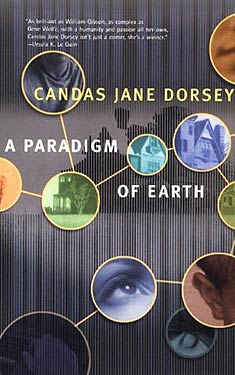Candas Jane
Dorsey
Completed 5/13/2020,
Reviewed 5/13/2020
3 stars
This book
had a lot of things going for it:
interesting concept, interesting characters, decent plot. Where it failed for me was in the pacing. It was too slow for me. It spent a lot of time in the main character’s
head. Granted, the book is about
depression, among other things. I think
judicious editing could have made it seem less plodding. The book was nominated for several awards,
including the Gaylactic Spectrum Award in 2002.
 (Sorry, the text wrapping function seems to be broken)
(Sorry, the text wrapping function seems to be broken)
The setting
is near-future Canada, where the political tide has turned very conservative. In particular, women, minorities, and the
LGBTQ+ community have lost many of their social gains. In this tense world, Morgan has inherited a
very large home in a Canadian Plains town.
To pay the bills on the house, she rents out the rooms to a group of
social and sexual misfits. She also answers
an ad for a child care facility which turns out to be a local government center
where they have an alien held. This
alien is one of thirteen scattered around the globe. The alien is an open book and needs to be taught
about Earth. It bonds with Morgan and
begins learning to speak and read. They
find out that these aliens have come to learn about Earth and take that knowledge
back to their planet. After a while, the
alien runs away from the facility only to end up at Morgan’s doorstep asking if
s/he can live there. Together with her eclectic roommates, the alien gets a
deep understanding of what it is to be human.
There’s a
subplot of a murder mystery amidst all this.
People around the alien turn up dead.
It sort of fits into the book, but it’s not a driving force in the
action. It’s almost as if the author was
looking for a little harder edge for the book.
But it too suffers from the slow pace of the book.
The
characters that make up the house are an interesting group. Most are bisexual or gay. One is in a wheelchair. Only one is completely straight, and he’s an
arrogant asshole. The local police force
also plays a big role in this book, keeping the house secure so that no harm
comes to the alien. The police
characters are also an interesting bunch.
It’s never really clear whether they are the enemy or not, but they do
keep the place relatively free of “vidarazzi”, the video paparazzi.
The stars of
the book are Morgan and Blue, the alien.
Morgan loses both parents at the beginning of the book. She never really grieves sufficiently, leaving
her in a state of depression. It keeps
her from having real relationships with her roommates, who are constantly
trying to reach through her despair. The
only real light in her life is her work with Blue. The depression is where the book often gets
derailed. There are long passages inside
Morgan’s head dealing with the depression.
To me, they were too long and too philosophical. This is where I think the editing could have
really helped. I often found my mind
wandering during these passages, and occasionally falling asleep.
Blue, as a
counterpoint to Morgan, is full of life. S/He begins as a child, learning everything
about life on Earth from scratch, including language and boundaries. In much of the book though, s/he is developmentally
a teenager. Between Morgan and the
internet, Blue develops mentally much more quickly than emotionally. And Blue’s ultimate question of life on Earth
is “what is love”.
So the book
is not as much about aliens as much as it is about love, depression, and being
human. Blue is merely the medium through
which these ideas are explored. It is
very much soft science fiction. I give
it three stars out of five. There were
simply too many long sections inside Morgan’s head that derailed the plot. This isn’t an action-packed book, but when
there was activity between the characters, it was much more interesting. By all rights, this could have been a four-star
book if it just moved along better.
No comments:
Post a Comment